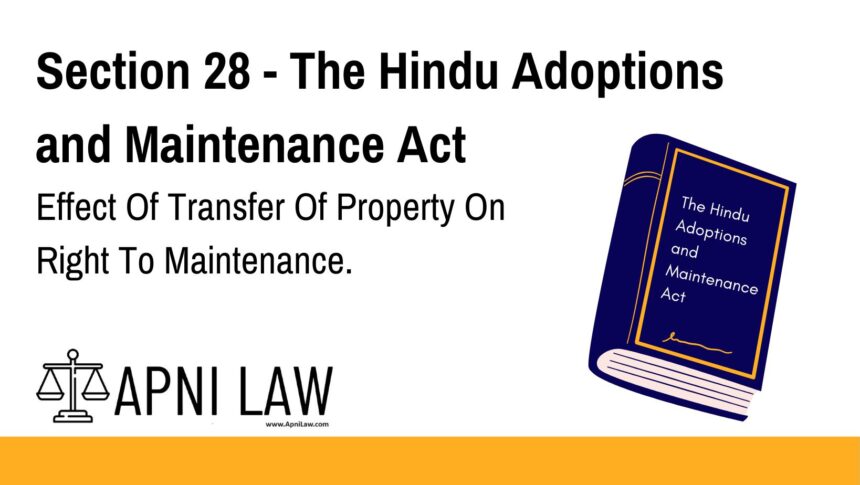Code: Section 28 of The Hindu Adoptions and Maintenance Act, 1956
“Where a dependant has a right to receive maintenance out of an estate and such estate or any part thereof is transferred, the right to receive maintenance may be enforced against the transferee if the transferee has notice of the right, or if the transfer is gratuitous; but not against the transferee for consideration and without notice of the right.”
Explanation of Section 28
Section 28 addresses the legal impact of a property transfer on a dependant’s right to maintenance. If a dependant is entitled to receive maintenance from a deceased person’s estate, and that estate (or any part of it) is later transferred to another person, this provision determines whether the dependant can still enforce their claim.
The key factor here is the nature of the transfer and the knowledge of the transferee:
- If the transferee had notice (i.e., was aware) of the dependant’s right to maintenance, the claim can be enforced.
- If the transfer was gratuitous (i.e., a gift or without consideration), the dependant can also enforce the maintenance claim against the transferee.
- However, if the transferee purchased the property for consideration (i.e., paid for it) and did not know about the dependant’s right to maintenance, the right cannot be enforced against them.
This section is designed to balance the rights of dependants with the protection of bona fide purchasers who may acquire property in good faith.
Key Points:
- A dependant’s right survives transfer only if:
- The transferee had notice of the right, or
- The transfer was made without consideration (gratuitous).
- No maintenance claim can be enforced against a purchaser for value without notice.
- Protects bona fide purchasers and ensures dependants act promptly to enforce their rights.
Illustration
Example 1: Transfer with Notice
A widow has a court-decreed right to maintenance from her late husband’s estate. If a part of that estate is gifted by the heir to a relative, the widow can enforce her maintenance right against that relative because the transfer was gratuitous.
Example 2: Bona Fide Purchaser
A buyer purchases a portion of the deceased’s estate at market value and without any knowledge of a dependant’s maintenance claim. In this case, the dependant cannot enforce the right against the purchaser, as the buyer acted in good faith and for value.
Common Questions and Answers on Section 28
- Can a dependant claim maintenance from property that was sold to a third party?
Yes, but only if the transferee had notice of the maintenance claim or if the transfer was not for value (gratuitous). - What constitutes “notice” under this section?
Notice can be actual (explicit knowledge) or constructive (information a reasonable person would be expected to know, such as registered court decrees). - Can the right to maintenance be enforced if the property is gifted to someone?
Yes. If the transfer is without consideration, the maintenance right can be enforced against the recipient. - How can a buyer protect themselves from future maintenance claims?
By conducting due diligence, checking public records, and verifying whether any known claims or court decrees exist on the estate. - Does a registered maintenance decree count as “notice”?
Yes, a registered decree would typically constitute constructive notice, and any buyer should be aware of it through proper legal checks.
Conclusion
Section 28 of the Hindu Adoptions and Maintenance Act ensures that dependants can protect their right to maintenance even after property is transferred—provided the transferee had notice or received the property gratuitously. However, it also safeguards bona fide purchasers who acquire property in good faith and without knowledge of any such claims. Dependants seeking to enforce their rights must act promptly and use legal channels to formalize their claims.
For more legal guidance on property rights and maintenance under Hindu law, visit ApniLaw.







